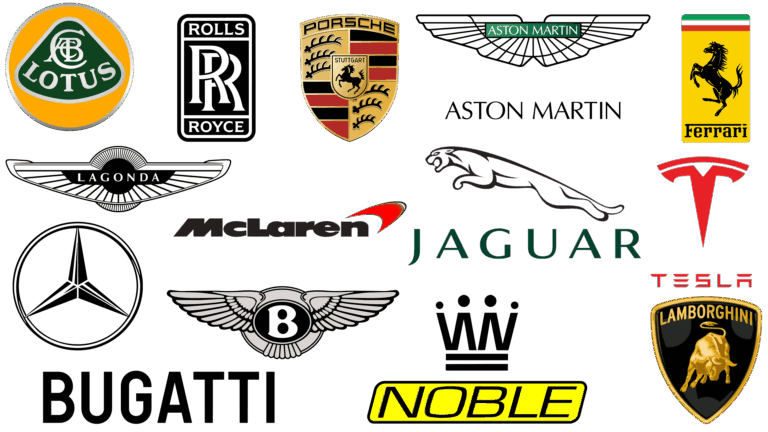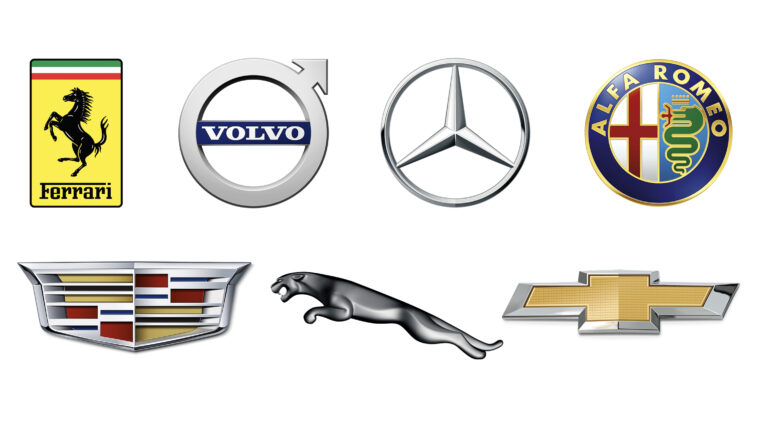Car Tire Brand Names: A Comprehensive Guide to Choosing Your Ride’s Foundation
Car Tire Brand Names: A Comprehensive Guide to Choosing Your Ride’s Foundation cars.truckstrend.com
Introduction: Beyond the Rubber – Understanding Car Tire Brand Names
Tires are arguably the most critical component of any vehicle, serving as the sole point of contact between your car and the road. Yet, for many drivers, they remain an afterthought until replacement becomes unavoidable. Choosing the right tires, however, is not merely about finding the correct size; it’s about selecting a brand that aligns with your driving style, vehicle type, local climate, and performance expectations. Car tire brand names are more than just labels; they represent decades, sometimes over a century, of engineering innovation, safety research, and a commitment to specific driving experiences.
Car Tire Brand Names: A Comprehensive Guide to Choosing Your Ride’s Foundation
Understanding these brands – their heritage, their technological advancements, and their market positioning – is crucial. A premium brand might offer superior grip and longevity, while a value brand could provide reliable performance at a lower cost. Some brands specialize in off-road prowess, others in whisper-quiet luxury, and an increasing number are focusing on the unique demands of electric vehicles. This comprehensive guide will delve into the world of car tire brand names, exploring the major players, their specialties, and how to make an informed decision that enhances your vehicle’s safety, performance, and fuel efficiency.
The Global Giants: Key Players in the Tire Industry
The tire industry is dominated by a few multinational conglomerates, each with a portfolio of distinct brands catering to various market segments. Understanding these major players is the first step in appreciating the landscape of tire brand names.
Premium & Performance Leaders
- Michelin (France): A global leader synonymous with innovation, performance, and luxury. Michelin tires are often original equipment (OE) on high-end vehicles and are known for their longevity, fuel efficiency (Green X technology), and exceptional grip in various conditions. They also own BFGoodrich and Uniroyal.
- Goodyear (USA): An iconic American brand with a rich history in motorsports and aerospace. Goodyear is known for its durability, all-season performance, and pioneering technologies like RunOnFlat tires. They also own Dunlop (in some regions) and Kelly Tires.
- Bridgestone (Japan): The world’s largest tire manufacturer, Bridgestone offers a vast range from high-performance to durable truck tires. They are a major OE supplier and are recognized for their quality, reliability, and innovative tread designs. They own Firestone.
- Continental (Germany): A leading German automotive supplier, Continental excels in safety, precise handling, and advanced technology. Their tires are often OE on European luxury cars and are highly regarded for their braking performance and comfort.
- Pirelli (Italy): Synonymous with performance and luxury sports cars, Pirelli is the exclusive tire supplier for Formula 1. Their tires are engineered for high-speed capabilities, exceptional grip, and precise handling, often at the expense of longevity.
Quality & Value Innovators
- Hankook (South Korea): A rapidly growing global brand known for offering excellent value without compromising on quality. Hankook has invested heavily in R&D, producing a diverse range of tires for passenger cars, SUVs, and trucks, gaining traction as OE suppliers for several automakers.
- Yokohama (Japan): Known for its focus on environmental sustainability and performance, Yokohama produces a range of high-quality tires for various applications, including passenger cars, SUVs, and motorsport. They emphasize precise handling and fuel efficiency.
- Toyo Tires (Japan): Popular among enthusiasts for their performance and aggressive styling, Toyo also offers durable and reliable tires for trucks and SUVs. They are known for their precision manufacturing and quality control.
- Cooper Tires (USA): An American heritage brand, Cooper is renowned for its reliable and durable tires, particularly popular in the truck and SUV segments. They offer a good balance of performance and value for everyday drivers.
- Kumho Tire (South Korea): Another strong contender from South Korea, Kumho offers a wide array of tires from budget-friendly options to performance-oriented models. They are recognized for their competitive pricing and improving quality.
![]()
Niche & Specialized Brands
- BFGoodrich (USA): Owned by Michelin, BFGoodrich specializes in rugged, high-performance tires for off-road vehicles, trucks, and SUVs. They are a favorite among off-road enthusiasts for their durability and traction.
- Dunlop (UK/USA): With a rich motorsport heritage, Dunlop (part of Goodyear in many regions) offers performance-oriented tires that prioritize handling and grip, often found on sports cars and performance sedans.
- Falken (Japan): A subsidiary of Sumitomo Rubber Industries, Falken focuses on high-performance and ultra-high-performance tires, often seen in drifting and motorsports. They offer a good blend of performance and value.
- Nexen (South Korea): A growing brand offering a wide range of tires, Nexen is known for its competitive pricing and increasing quality, often providing a solid option for budget-conscious buyers.
Understanding Tire Categories and Brand Specialization
While brands offer a wide range, many have particular strengths or specialties. Knowing the tire category you need will help narrow down the most suitable brands.
- All-Season Tires: Designed for year-round performance in moderate climates, offering a balance of wet, dry, and light snow traction. Most major brands (Michelin, Goodyear, Bridgestone, Continental, Hankook) offer extensive all-season lines.
- Summer Performance Tires: Optimized for warm weather, providing maximum grip, handling, and braking on dry and wet roads. Brands like Pirelli, Michelin (Pilot Sport), Continental (ExtremeContact), and Yokohama (Advan) excel here.
- Winter/Snow Tires: Engineered with specialized rubber compounds and tread patterns to maintain flexibility and grip in freezing temperatures, snow, and ice. Brands like Nokian (Hakkapeliitta), Michelin (X-Ice), Bridgestone (Blizzak), and Continental (VikingContact) are highly regarded for winter performance.
- All-Terrain (A/T) & Mud-Terrain (M/T) Tires: Built for trucks, SUVs, and off-road vehicles, these tires offer aggressive tread patterns for traction on dirt, mud, rocks, and gravel. BFGoodrich (All-Terrain T/A KO2), Cooper (Discoverer), Toyo (Open Country), and Goodyear (Wrangler) are strong contenders.
- Touring Tires: Prioritize comfort, quiet ride, and long tread life. Often found on sedans and minivans, brands like Michelin (Defender), Goodyear (Assurance), and Continental (PureContact) are known for their touring lines.
- Run-Flat Tires: Designed to allow continued driving for a limited distance after a puncture. Many premium brands like Michelin, Goodyear, Bridgestone, and Continental offer run-flat versions of their popular models.
- Electric Vehicle (EV) Tires: A newer category focusing on low rolling resistance for extended range, reduced road noise, and high load capacity to handle the weight of EV batteries. Michelin (Pilot Sport EV), Goodyear (ElectricDrive), and Hankook (Kinergy AS EV) are developing specialized EV tires.
Factors Influencing Brand Choice: Important Considerations
Selecting the right tire brand is a decision influenced by several critical factors:
- Vehicle Type & Driving Style: A sports car demands performance tires, while a family sedan might prioritize comfort and longevity. Aggressive drivers need tires with superior grip, while commuters might prefer fuel efficiency and quietness.
- Climate & Road Conditions: If you live in a region with harsh winters, dedicated winter tires from a reputable brand are a must. For rainy climates, tires with excellent wet traction are paramount.
- Budget: Tire prices vary significantly. Premium brands offer top-tier performance and features but come at a higher cost. Mid-range brands provide a good balance of quality and value, while economy brands are suitable for budget-conscious drivers with less demanding needs.
- Warranty & Customer Service: Some brands offer better treadwear warranties or road hazard protection. Researching a brand’s customer service reputation can be beneficial.
- Original Equipment (OE) vs. Aftermarket: Many car manufacturers partner with specific tire brands as OE suppliers (e.g., Michelin on BMWs, Bridgestone on Subarus). While sticking to OE can ensure optimal performance, aftermarket options often provide more choices and sometimes better value.
- Tire Reviews & Ratings: Independent reviews from organizations like Consumer Reports, Tire Rack, and professional automotive publications offer invaluable insights into real-world performance. Look at UTQG (Uniform Tire Quality Grading) ratings for treadwear, traction, and temperature.
Practical Advice and Actionable Insights for Choosing a Tire Brand
- Assess Your Needs First: Before looking at brands, determine what you need most: ultimate grip, long tread life, quiet ride, off-road capability, or all-season versatility.
- Consult Your Vehicle’s Manual: Your car’s owner’s manual specifies the recommended tire size, load index, and speed rating. Adhering to these specifications is crucial for safety and performance.
- Read Reputable Reviews: Don’t rely solely on marketing. Websites like Tire Rack provide extensive user reviews and comparison tests that can highlight a brand’s strengths and weaknesses for specific models.
- Talk to a Tire Professional: Experienced tire retailers can offer personalized advice based on your vehicle, driving habits, and budget.
- Consider the Whole Package, Not Just Price: A cheaper tire might wear out faster, offer less grip, or provide a harsher ride. Investing in a slightly more expensive, reputable brand often pays off in safety, longevity, and overall driving satisfaction.
- Look for Rebates and Promotions: Tire brands frequently offer rebates, especially during seasonal sales, which can make premium tires more affordable.
Potential Challenges & Solutions
- Overwhelming Choices: The sheer number of brands and models can be daunting. Solution: Start by defining your top 2-3 priorities (e.g., "good in snow," "long-lasting," "affordable"), then research brands known for those attributes.
- Misleading Marketing: Tire advertising can be full of jargon. Solution: Focus on objective data like UTQG ratings, independent test results, and verified customer reviews rather than just catchy slogans.
- Balancing Cost vs. Performance: It’s tempting to opt for the cheapest tire. Solution: Remember that tires are a safety item. While budget is important, compromising too much on quality can affect braking, handling, and fuel efficiency, potentially costing more in the long run.
- Counterfeit or Substandard Tires: Buying from unauthorized sellers can lead to dangerous, low-quality tires. Solution: Always purchase tires from reputable dealerships, established tire shops, or authorized online retailers.
Car Tire Brand Names: Illustrative Price Range & Specialties
Note: Prices are highly variable based on tire size, specific model, retailer, and promotions. This table provides illustrative average price ranges per tire for common passenger vehicle sizes and general brand specialties.
| Brand Name | Typical Price Range (per tire)* | Key Strengths/Specialties | Target Audience |
|---|---|---|---|
| Michelin | $150 – $400+ | Premium performance, longevity, fuel efficiency, comfort | Luxury, performance, everyday drivers seeking top quality & long life |
| Goodyear | $120 – $350+ | All-season versatility, durability, run-flat technology | Mainstream, SUVs, trucks, drivers seeking reliable year-round performance |
| Bridgestone | $120 – $350+ | OE supplier, reliable performance, diverse range, safety | Wide appeal, performance, SUVs, trucks, drivers seeking balanced quality |
| Continental | $130 – $380+ | Safety, precise handling, OE supplier, quiet ride | Luxury, performance, drivers prioritizing safety & refined driving experience |
| Pirelli | $140 – $450+ | High-performance, luxury sports cars, motorsports | Enthusiasts, luxury vehicle owners, performance-oriented drivers |
| Hankook | $90 – $250+ | Excellent value, growing quality, diverse range | Mainstream, budget-conscious, everyday drivers seeking good value |
| Yokohama | $100 – $280+ | Performance, environmental focus, precise handling | Enthusiasts, mainstream, environmentally conscious drivers |
| Toyo Tires | $100 – $300+ | Performance, truck/SUV, aggressive styling | Enthusiasts, truck/SUV owners, drivers seeking performance & style |
| Cooper Tires | $80 – $200+ | Durable, good value, strong in truck/SUV segments | Truck/SUV owners, budget-conscious drivers, everyday reliability |
| Kumho Tire | $70 – $180+ | Value, improving quality, diverse passenger car range | Budget-conscious, mainstream drivers, those seeking affordable options |
| BFGoodrich | $100 – $300+ | Off-road prowess, rugged durability, truck/SUV | Off-road enthusiasts, truck/SUV owners, adventurous drivers |
| Falken | $80 – $220+ | Performance, ultra-high performance, motorsports | Enthusiasts, budget-conscious performance seekers |
| Nokian | $130 – $300+ | Exceptional winter performance, safety in harsh conditions | Drivers in cold climates, those prioritizing winter safety |
Frequently Asked Questions (FAQ) about Car Tire Brand Names
Q1: Which tire brand is the "best overall"?
A1: There is no single "best" tire brand overall, as the ideal choice depends entirely on your specific needs, vehicle type, driving conditions, and budget. Each brand has its strengths and specialties. For example, Michelin might be best for luxury comfort and longevity, while Pirelli excels in high-performance sports cars.
Q2: Are more expensive tire brands always better?
A2: Generally, more expensive premium brands invest more in R&D, advanced materials, and sophisticated manufacturing processes, often resulting in superior performance (grip, braking), comfort, longevity, and fuel efficiency. However, a mid-range brand might offer excellent value for everyday driving needs, and for some specific applications (e.g., extreme off-roading), a specialized, rugged brand might be better than a luxury performance brand.
Q3: How often should I replace my tires, regardless of brand?
A3: Most manufacturers recommend replacing tires after 6 years, regardless of tread depth, due to rubber degradation over time. Some suggest a maximum of 10 years. However, tread depth is a critical factor: when it reaches 2/32 of an inch (1.6 mm), tires must be replaced immediately for safety. Regular inspections for cracks, bulges, and punctures are also vital.
Q4: Can I mix tire brands on my car?
A4: It is strongly recommended not to mix different tire brands or even different models of the same brand, especially on the same axle. Mixing tires can lead to uneven handling, braking, and stability issues because different tires have varying tread patterns, compounds, and constructions. If you must replace only two tires, ensure they are the same brand, model, and type as the other two, and ideally, place the new tires on the rear axle for better stability.
Q5: What do the numbers and letters on a tire mean, and how do they relate to brand choice?
A5: The sidewall of every tire has a code (e.g., P205/55R16 91V).
- P: Passenger car tire (or LT for Light Truck).
- 205: Section width in millimeters.
- 55: Aspect ratio (sidewall height as a percentage of width).
- R: Radial construction.
- 16: Rim diameter in inches.
- 91: Load index (how much weight the tire can carry).
- V: Speed rating (maximum safe speed for the tire).
While these specs are universal, specific brands will excel at different speed ratings or load capacities based on their target market (e.g., a performance brand will have many high-speed-rated tires). Always match these specifications to your vehicle’s requirements, which are typically found on a sticker inside the driver’s door jamb or in the owner’s manual.
Conclusion: The Foundation of Your Drive
Choosing the right car tire brand names is more than just a transaction; it’s an investment in your vehicle’s safety, performance, and the overall quality of your driving experience. From the pioneering innovations of Michelin and Goodyear to the specialized ruggedness of BFGoodrich and the value of Hankook, each brand offers a unique proposition. By understanding their strengths, considering your specific needs, and leveraging available resources like reviews and professional advice, you can confidently select the perfect set of tires to be the reliable foundation for every journey. Remember, your tires are the only part of your car that touches the road – choose wisely.
![]()




